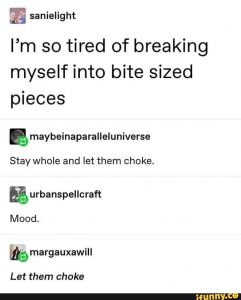He took a long drag on his cigarette, enjoying the faint sizzle of the paper as he inhaled deeply. The morning sunlight reflected off the water below in a rapid, dazzling display of dance. He didn’t allow himself many rituals because they were too risky, but every time he had business in this little boom-and-bust town he stopped by this spot beside the river to enjoy his morning cigarette. The small comforts were the only comforts he had at all considering he had no fixed address and moved from town to town doing what he was told.
He knew why he was there, again, and hated knowing that he was delivering shitty drugs cut with god-knows-what to this unassuming little town. Running drugs was just one errand on a long list of errands that he took care of but didn’t care for. At least the drug runs were better than the hits. It wasn’t required of him often, less than half a dozen times in all the 40 years he’d been working for the Boss, but sometimes he’d been ordered to take someone out and he’d followed orders because that’s what he did. Maybe, if things had been different, he’d have been something else like a banker (he’d always liked numbers), or a salesman, or maybe he’d have worked at the mill like his dad. Things were what they were, though. He’d killed his father when he was 15 and he figured if you could commit one crime out of necessity then you might as well commit a lot of them out of necessity.
He couldn’t remember the first time his father flew into a rage and hit his mother but there were plenty of times in between that were lodged into some deep part of his brain where probably nothing short of dementia could knock it out for good. It’s the last time that mattered most, though. It’s that time that changed the entire trajectory of his life.
Mom, despite her hidden bruises and constant fear, had wanted to be a writer. She’d applied to their local rinky-dink newspaper to write a column of some sort, and by some miracle (disaster was more like it) they’d agreed to let her write it. She’d hauled down the old typewriter from the attic—a beast of a thing—and went right to work with her fingers flying like her hands knew what they were doing, despite the fact that she hadn’t typed since the year after she’d married his father. He’d arrived home from school to the racket of the keys as their old hammers clacked in complaint after years of neglect. He was only home long enough to change and slug back a glass of cool water before heading out to mow a few large lawns two streets over. His mom had barely noticed him, such was her excitement. The lawns had taken him longer than expected because one of the neighbours had been chatty and another had to wait for her husband to arrive home so that she could pay him for his work.
When he finally pushed the mower up the driveway and into the garage he was hot and sweaty, and looking forward to dinner and something cold to drink. His father’s car was in the driveway, home from his shift at the mill. It wasn’t until he entered the cool dimness of the house and his eyes adjusted that he was able to make out what was going on. His father was choking his mother, nearly lifting her off the ground as she clawed at his hands, desperately scrabbling for air in her lungs and floor beneath her feet.
Sometimes he took the brunt of his father’s anger but far more often than not it was his mother. He could only imagine his father’s reaction to his mother’s declaration that she was going to write for the paper. He could imagine his father saying something like “No wife of mine is going to write for that shit-show of a liberal rag”. His mother managed a choking sound and he instinctively kicked his father in the shins—a surprise that made his father drop his mother to the floor where she lay in a defeated heap, gulping air and trying to recover in preparation for whatever blows were to come next. The blows would come, but they wouldn’t be what she expected. His father turned towards him then, and he could see the rage in his father’s face. He had seen his father angry a hundred—or a thousand—times, but this was new. This was some next level bullshit that he was about to bring down upon this household. He could almost smell the murder radiating off of his father—the smell of wood chips from the mill mixed with hot, sweaty adrenaline and fury.
He picked up the old typewriter from the kitchen table and with all his might he connected it to his father’s skull. The force with which he struck his father’s head caused a few of the arms and keys to snap off and clatter to the floor with the heft of their metal. The real weight was in the realization that he’d killed his own father, which was evident from the blood quickly pooling around his father’s head on the kitchen floor. His gaze shifted from the blood to his mother’s mouth that was frozen in a perfect O of horror, which he found ironic in its mirroring of the O key that had settled on the floor under the kitchen table. Oh-Oh.
His mother quickly regained composure. She ran her hands down her apron to smooth it and started to tell him how they would hide the body, but he stopped her. “It’s no use, Mom”, he said. It was only then that she cried. Not for her dead husband whose brains were congealing on the floor, or for the swollen split in her lip, or for the marks that were quickly appearing on her neck, but because she knew that she might never see her son again. He would have to leave and never come back. She thought to herself, momentarily, that she couldn’t have written a more terrible ending if she’d tried, and then she wondered if she was losing her mind to be thinking of a thing like that at a time like this.
He was already racing around the house and tossing things into a duffle bag. He didn’t need much. He didn’t have much. Some clothes, a wad of cash he’d been hiding in a shoe box in his closet that he’d earned mowing lawns and doing other odd jobs around the neighbourhood. As he closed his hands around the cash he thought about what he’d been saving it for—for him and his mom to get away from here, from him. And now they were both free, in a way, except he never really would be because he’d have to stay on the move and always moving away from something wasn’t much different than never really getting away from it at all.
By the time he’d collected his few belongings, his mom was in the doorway, saying that he didn’t have to go right this minute, that she could call the cops in the morning, that he should sleep in his own bed for the night and leave in the daylight, but he couldn’t stay and he certainly couldn’t think about sleep. He feared he wouldn’t have the guts to leave if he stayed in the house another night.
It had been almost 20 years before he’d dared to call his mother. He was nearly 35, and it suddenly struck him that he was the same age as she had been when he’d left. He’d used a pay phone, and when she’d answered the line was slightly crackly, much like his nerves. The sound of her voice saying “Hello?” made his stomach clench up and his bowels feel loose. Twenty years without hearing the voice of the woman who had tucked him in at night with stories of Henry and Ribsy, the woman who had stirred ginger ale until it was flat and brought it to him in bed when we was sick, the woman who had tried to protect him as best she could in the circumstances they were dealt.
Though he was now a grown man, his voice cracked and he heard himself squeak out the word, “Mom?”, and it didn’t matter that twenty years had passed because she was his mother and he was her son. Twenty minutes was all he’d allowed himself—one minute for each year he’d been away from her. He wished he had longer to talk, but he had to keep moving. Always moving, never really going anywhere at all. In the end, he had promised he’d try to call again, maybe later in the year around Christmas time.
He’d taken care to change his name, change his appearance, and always gave a wide berth to his home town. He took another drag on his cigarette and thought about the fact that he’d managed to dodge the police for all these years. It wasn’t something he felt smug about because he’d never been trying to outsmart them. He was just trying to survive. Somehow, he’d managed to remain out of prison but even that was such a small comfort.
He dropped the remainder of his cigarette on the ground and crushed it under it boot. He had another long day and many miles ahead of him.
———————————————————————————————–
Note: Short story writing is not something I’m experienced at but, for whatever reason, it’s been one way that my brain has been working through snippets of memories, lately. To be clear, nothing in this story is based on any real-events that I know of, except for a tiny detail. Years ago, about once a week or so on my early morning commutes to work, I’d see the same person pulled over at the side of the road, smoking a cigarette, looking out at the river. He was older than the character in my story, but I wanted time lines to match up in terms of how old he’d have likely been in the years that my story is set. I made up this story in my head about him, though I didn’t put any details down on paper (if that’s what we call phone memos and Word docs) for years. Instead, I thought of him as “The Smoking Man”, and that’s what I called my story as a working title, but I know it has too great an association with The X-Files to be a good choice. The commute I was making was to a job that I loved but also that involved listening to a lot of people’s stories of trauma. It’s impossible not to be affected by that type of work, in at least a hundred different ways. For whatever reason, my brain keeps knocking bits of memory loose from that time, recently, and I keep working through them in the form of short stories that I write in my head. I have another one I’d like to attempt to write next but it’s going to be a much greater challenge. Some stories are simply harder to detach yourself from but maybe that’s the best reason to tell them.

